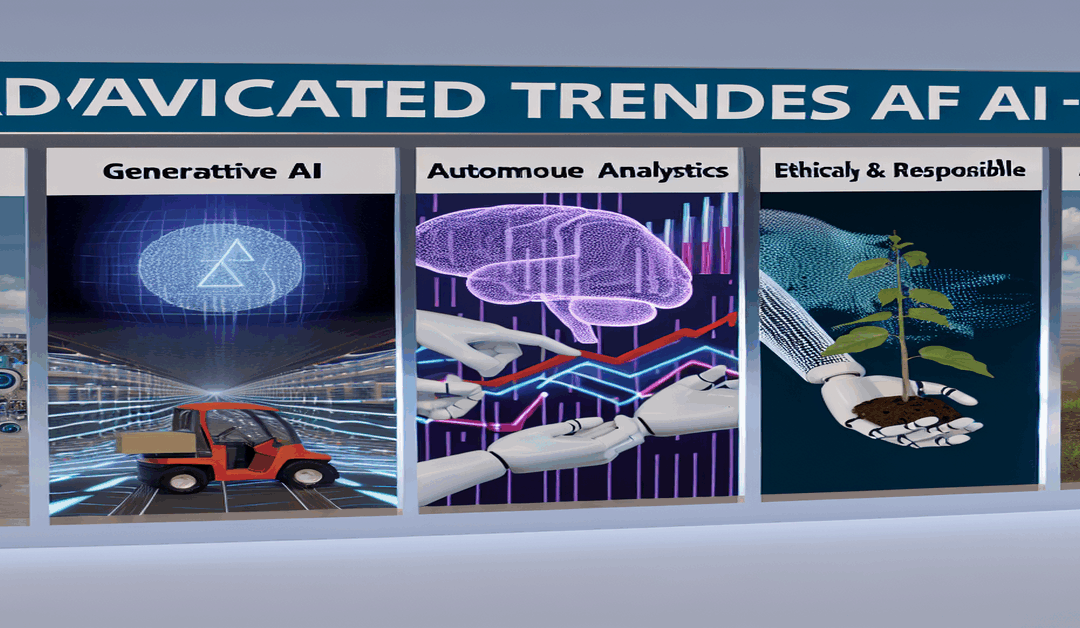5 AI Trends Revolutionizing Business Performance and ROI in 2025
As we approach the mid-2020s, the rapid advancements in Artificial Intelligence (AI) are set to transform the business landscape, driving innovation and boosting return on investment (ROI) across industries. From generative AI to autonomous agents, these cutting-edge technologies are poised to streamline operations, enhance decision-making, and unlock new opportunities for growth. In this blog post, we’ll explore five key AI trends that are shaping the future of business and delivering measurable results.
1. Generative AI: Unleashing Creative Potential
Generative AI, powered by deep learning algorithms, is revolutionizing content creation and customer engagement. By leveraging vast amounts of data, generative AI models can produce highly realistic and personalized content, such as images, videos, and text, in a fraction of the time it would take human creators. This technology is already being applied in various domains, from marketing and advertising to product design and entertainment.
One notable example is NVIDIA’s AI Playground, which showcases the capabilities of generative AI in creating stunning visual content. By harnessing the power of generative AI, businesses can significantly reduce content creation costs while delivering engaging experiences that resonate with their target audience. As a result, companies can expect higher conversion rates and improved ROI from their marketing efforts.
2. AI-Powered Analytics: Unlocking Insights at Scale
In the era of big data, AI-powered analytics is becoming increasingly crucial for businesses to make sense of the vast amounts of information at their disposal. By leveraging machine learning algorithms and natural language processing (NLP), AI analytics tools can process and analyze structured and unstructured data in real-time, providing actionable insights for decision-making.
According to a McKinsey survey, companies that have adopted AI in their business processes have seen a 40% reduction in analysis time and improved predictive accuracy, particularly in sectors like retail and finance. With the ability to identify patterns, detect anomalies, and forecast trends, AI-powered analytics empowers organizations to make data-driven decisions, optimize operations, and uncover new revenue streams.
3. Autonomous AI Agents: Streamlining Complex Tasks
As AI technologies advance, we are witnessing the rise of autonomous AI agents capable of handling complex tasks independently. These intelligent systems can learn from their interactions with the environment and adapt their behavior accordingly, enabling them to tackle challenges that were previously the domain of human experts.
Autonomous AI agents find applications in various fields, from scientific research and healthcare to manufacturing and logistics. By delegating repetitive and time-consuming tasks to AI agents, businesses can streamline their workflows, reduce human error, and free up their workforce to focus on higher-value activities. This not only boosts productivity but also leads to cost savings and improved operational efficiency.
4. Ethical and Responsible AI: Building Trust and Transparency
As AI becomes more prevalent in business and society, the need for ethical and responsible AI practices cannot be overstated. Companies must prioritize the development of AI systems that are transparent, accountable, and aligned with human values. This involves establishing clear guidelines for data privacy, algorithmic fairness, and explainable AI.
Leading organizations are already taking steps to address these concerns. For example, Microsoft’s Responsible AI principles emphasize fairness, reliability, privacy, security, inclusiveness, transparency, and accountability in AI development and deployment. By adopting such frameworks, businesses can foster trust among their stakeholders and ensure that their AI initiatives are socially responsible and sustainable.
5. AI for Global Challenges: Aligning Innovation with Impact
Beyond driving business performance, AI has the potential to tackle some of the world’s most pressing challenges, from climate change and healthcare to poverty and inequality. By harnessing the power of AI for social good, companies can align their innovation efforts with broader societal impact, creating shared value for all stakeholders.
Initiatives like AI for Good bring together experts from industry, academia, and government to explore how AI can be leveraged to advance the United Nations’ Sustainable Development Goals (SDGs). By collaborating on AI-driven solutions for climate action, healthcare access, and sustainable cities, businesses can contribute to a more equitable and resilient future while also enhancing their brand reputation and customer loyalty.
Embracing the AI-Driven Future
As we look ahead to 2025 and beyond, it is clear that AI will play an increasingly central role in shaping the business landscape. From generative AI and autonomous agents to ethical practices and global impact, these trends represent both challenges and opportunities for organizations across industries.
To stay ahead of the curve, business leaders must proactively invest in AI technologies, build the necessary talent and infrastructure, and foster a culture of innovation and continuous learning. By embracing these AI trends and aligning them with strategic goals, companies can unlock new sources of value, drive operational excellence, and position themselves for long-term success in the age of intelligent machines.
As you embark on your own AI journey, remember that the key to success lies not just in the technologies themselves, but in how you harness them to create meaningful outcomes for your business and society at large. By staying informed, adaptable, and purpose-driven, you can navigate the AI-powered future with confidence and resilience.
#ArtificialIntelligence #InnovationTrends #BusinessTransformation #DataDrivenInsights #EthicalAI
-> Original article and inspiration provided by Analytics Insight
-> Connect with one of our AI Strategists today at ReviewAgent.ai

